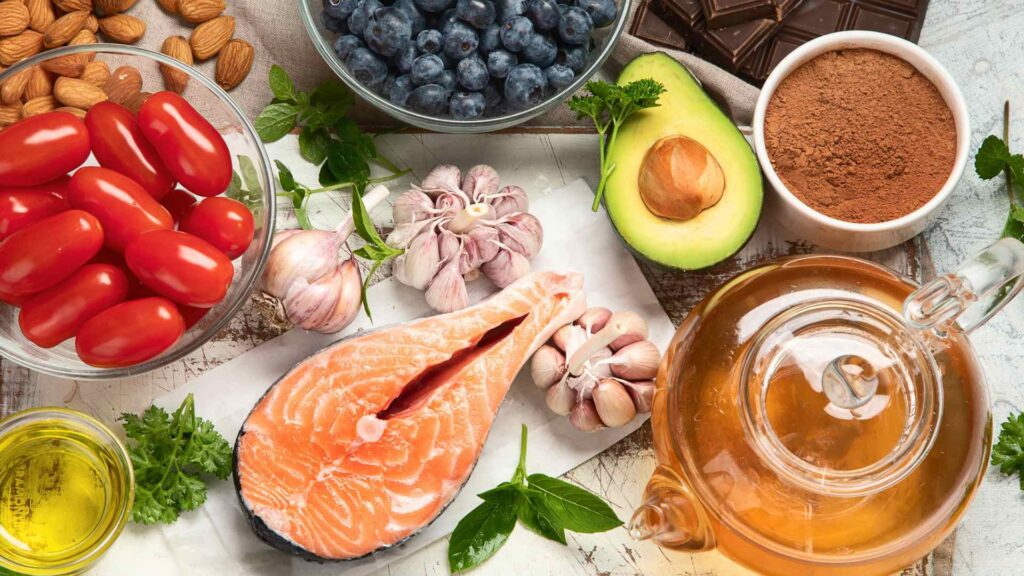Chronic inflammation has become a silent epidemic, leading to a host of health issues like heart disease, diabetes, and even cancer. Fortunately, there’s a powerful tool at your disposal to combat inflammation and enhance your overall well-being: the anti-inflammatory diet. In this blog, we will explore the benefits and principles of this diet, and how you can optimise your health while satisfying your taste buds.
What is an Anti-Inflammatory Diet?
An anti-inflammatory diet is a way of eating that focuses on consuming foods that help reduce inflammation in the body. This type of diet emphasises whole, natural, and unprocessed foods that are rich in anti-inflammatory nutrients and compounds. By making informed dietary choices, you can effectively manage and prevent inflammation-related health conditions.
Benefits of an Anti-Inflammatory Diet
Reduced Risk of Chronic Diseases
An anti-inflammatory diet can significantly lower the risk of chronic diseases such as heart disease, diabetes, and certain cancers. The anti-inflammatory properties of these foods help protect your body against these health threats.
Improved Digestive Health
Inflammation is often linked to digestive disorders. By reducing inflammation, this diet can alleviate symptoms of conditions like irritable bowel syndrome (IBS) and inflammatory bowel disease (IBD).
Weight Management
Maintaining a healthy weight is crucial for reducing inflammation. An anti-inflammatory diet supports weight loss and helps prevent obesity-related inflammation.
Enhanced Brain Health
Inflammation is implicated in neurodegenerative diseases like Alzheimer’s. Consuming anti-inflammatory foods can improve overall cognitive function and brain health.
Key Principles of an Anti-Inflammatory Diet
Load up on Fruits and Vegetables
Fruits and vegetables are rich in antioxidants, vitamins, and minerals that combat inflammation. Berries, leafy greens, and citrus fruits are especially effective.
Embrace Healthy Fats
Incorporate sources of healthy fats like avocados, olive oil, nuts and seeds into your diet. Also oily fish, such as salmon and mackerel are rich in omega-3 fatty acids, which have potent anti-inflammatory properties.
Choose Whole Grains
Opt for whole grains like brown rice, quinoa, and oats over refined grains. These provide essential fibre and nutrients to support gut health.
Lean Protein Sources
Select lean sources of protein such as chicken, turkey, beans, and tofu to reduce inflammation and build muscle.
Spice It Up
Turmeric, ginger, and garlic are spices that contain anti-inflammatory compounds. Incorporate them into your cooking for added flavour and health benefits.

Foods to Include in an Anti-Inflammatory Diet
- Oily fish (salmon, mackerel)
- Berries (blueberries, strawberries)
- Leafy greens (spinach, kale)
- Nuts and seeds (walnuts, flaxseeds)
- Olive oil
- Turmeric
- Ginger
- Garlic
- Avocados
- Whole grains (quinoa, brown rice)
Foods to Avoid for an Anti-Inflammatory Diet
- Processed foods high in ‘vegetable’ oils
- Sugary beverages
- Excessive red meat
- Processed meats
- Refined grains (white bread, white rice)
- High-sugar snacks
- Excessive alcohol
Lifestyle Tips for Reducing Inflammation
In addition to following an anti-inflammatory diet, these lifestyle changes can further reduce inflammation:
- Regular exercise (walking, swimming, stretching, gardening)
- Stress management techniques (yoga, meditation)
- Sufficient sleep (7-9 hours per night)
- Hydration with water and herbal teas
An anti-inflammatory diet is a powerful tool to combat chronic inflammation and improve your overall health. By adopting these dietary principles and incorporating anti-inflammatory foods into your meals, you can take a significant step toward a healthier, inflammation-free life.
Remember to consult with a nutrition & health coach or nutritional therapist before making major dietary changes, especially if you have existing health conditions. View our find a practitioner page to find a nutritional therapist or nutrition & health coach in your area.











